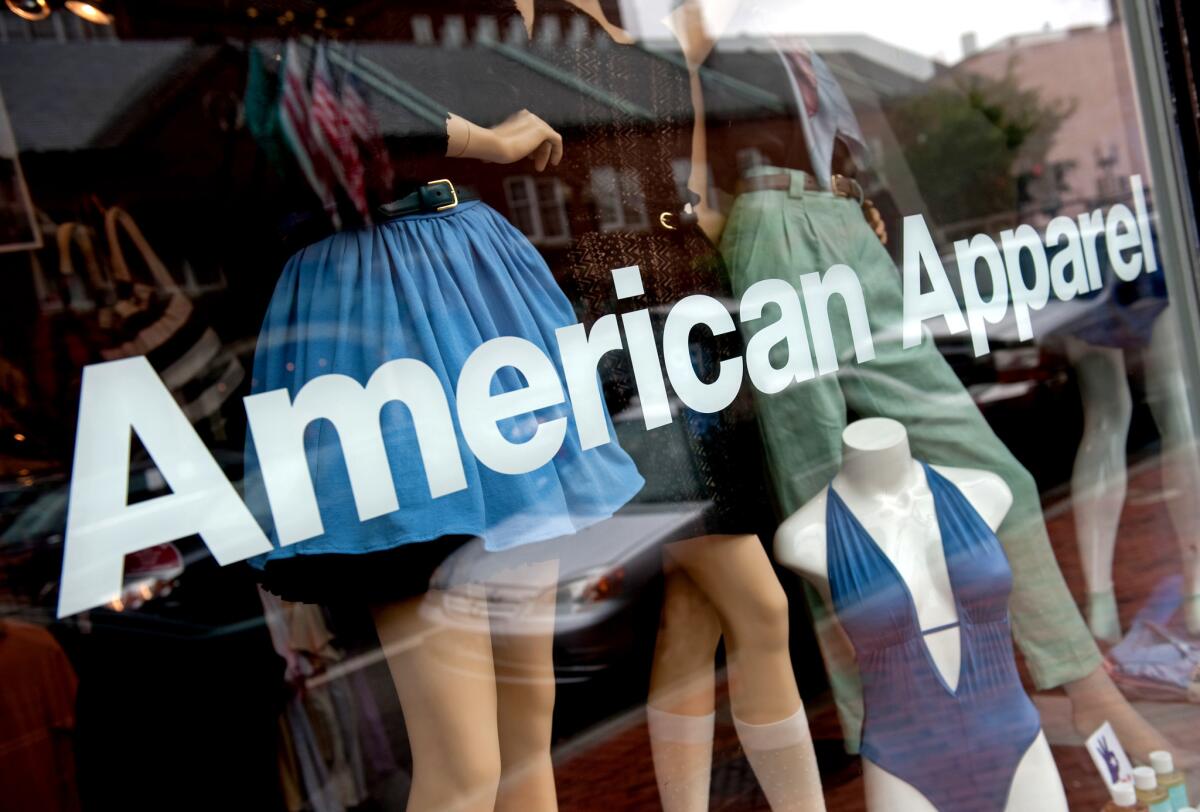American Apparel taps top lawyer as CEO as sale rumors swirl

American Apparel’s incoming chief executive is a lawyer with a background in mergers and acquisitions and little retail experience — yet another sign that the troubled retailer may be heading for a sale soon.
Chelsea Grayson has served as general counsel for American Apparel for nearly two years. She is stepping into a role that will be vacated Monday by Paula Schneider, the CEO brought aboard last year to turn around the company’s fortunes.
Schneider’s departure marks the second recent loss for the Los Angeles company, whose racy advertising and colorful fashion basics made it an industry darling before it slid into a years-long decline. Chairman Paul Charron, a former CEO of Liz Clairborne, left last month. He was succeeded by fellow board member Brad Scher, founder of consulting firm Ocean Ridge Capital Advisors.
American Apparel is now hunting for a buyer, said two sources who were not authorized to speak publicly about the company’s inner workings. Coming less than a year after it exited bankruptcy, hanging a “for sale” sign indicates that the company is in deep trouble and requires a quick rescue, analysts said.
“Nobody expected them to put it out in the marketplace so fast,” said Lloyd Greif, chief executive of investment banking firm Greif & Co. “That means the company is bleeding. It’s hemorrhaging.”
Greif said that the chairman and CEO’s exit in quick succession also signals that the board was unhappy with the turnaround efforts. Another sign of a future sale is Grayson’s appointment; she lacks the background to helm a retailer for long, analysts said.
Grayson is in “a caretaker role,” Greif said. “They recognize the company is going to get acquired and whoever buys it is going to bring in their own management.”
Asked about a possible sale, American Apparel said it “does not comment on rumors or speculation.”
“As we have regularly communicated to employees, vendors and customers, we continuously evaluate strategic partnership opportunities to fuel the growth of the brand,” the company said in a statement.
Los Angeles investment bank Houlihan Lokey has been hired to explore a sale, two sources said. Grocery magnate Ron Burkle’s Yucaipa Cos. has looked into American Apparel’s finances, according to Women’s Wear Daily.
In the case of a sale, the two most likely types of buyers are a branding and licensing company or a private equity firm, analysts said.
In the first scenario, American Apparel would be added to a stable of other brands under a company like Iconix Brand Group (which owns Sharper Image, Ed Hardy and Candie’s), Sequential Brands Group (Martha Stewart, Jessica Simpson and Ellen Tracy) or Authentic Brands Group (Frederick’s of Hollywood and Jones New York). Then the American Apparel brand would be licensed to other manufacturers and retailers, for a fee — meaning that shoppers may see American Apparel products sold at other retailers, rather than its own stores, and made by several companies that have inked licensing deals.
A private equity firm, one skilled with turning around distressed companies, could also swoop in. But it might hesitate to take on a company that is both in the changeable fashion business and saddled with so much baggage, analysts said.
“It’s a situation where the brand is stronger than the company,” said Craig Johnson, a retail expert at Customer Growth Partners. The board is probably thinking that “half a loaf is better than none,” he said. “The best possible route now is a strategic sale to a strategic buyer.”
To lure a buyer, American Apparel may have to file for bankruptcy protection again, analysts said. That will allow the company to shed additional costs, such as leases to under-performing stores, to make it more attractive to suitors.
American Apparel could still try to go forward without selling, Johnson said. That would also involve closing many, if not all its stores (possibly keeping its international stores open, where the brand still has a lot of cachet). The company could focus instead on selling online and through teen-oriented retailers such as Pacific Sunwear of California (which itself was acquired by a private equity firm this month) or rue21.
It “could emerge as a much smaller and healthier company,” Johnson said. “Then you build yourself back up.”
He pointed to Tommy Hilfiger, which enjoyed its heyday in the 1990s, but later retrenched after sales flagged in the early 2000s. The company focused on its strong European business, and has recaptured some of its earlier popularity.
Already, American Apparel has been edging away from its roots as a brand that designed and made its clothing in Los Angeles. Buyers probably would move manufacturing to either a low-cost state in the U.S. or outsource production overseas.
That is, unless the dark horse candidate — founder Dov Charney — emerges as a buyer, yet again.
Charney was ousted in 2014 as chairman and CEO after an investigation uncovered allegations of misuse of company funds and inappropriate behavior with employees. Charney built up American Apparel into an internationally famous, publicly traded clothier after moving the company to Los Angeles in 1997. But at the time of his ouster, American Apparel had been losing money for years and was heavily in debt.
After getting kicked out, Charney mounted multiple attempts to seize back control. His $300-million takeover bid, submitted after after American Apparel filed for Chapter 11, was rejected by the board in January.
“Is there a possibility he gets a second pass at buying it out of bankruptcy?” Greif said. “The answer is yes.”
Follow Shan on Twitter @ByShanLi
More to Read
Inside the business of entertainment
The Wide Shot brings you news, analysis and insights on everything from streaming wars to production — and what it all means for the future.
You may occasionally receive promotional content from the Los Angeles Times.











